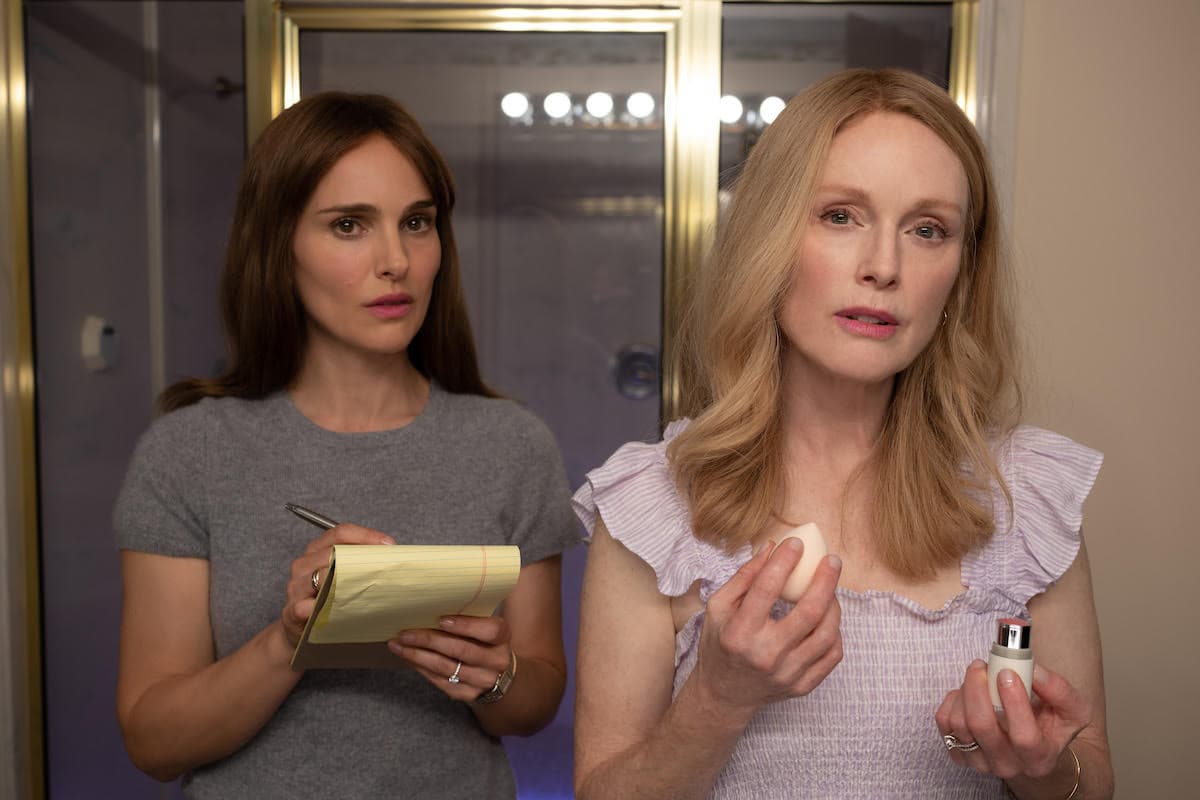Julianne Moore and Natalie Portman Cast Their Spells in Todd Haynes’ Unsettling ‘May December’
As in a soap opera, which the movie’s tone emulates at times, some aspects don’t ring true, but you ignore them because the drama is so delicious.

Has there been a more riveting scene all year than the one in which Julianne Moore applies makeup to Natalie Portman’s face in the new Netflix movie “May December”? Respectively, the pair play a middle-aged woman who committed a sex crime years prior and a 30-ish Hollywood actress, and in the scene, the two distinct women almost meld into one character.
Both start out looking towards, if not directly at, the camera, which is ostensibly a mirror. Then Gracie — Ms. Moore — turns to face Elizabeth — Ms. Portman — to do her cheeks and lips. In profile, they talk lightly of acting, intelligence, and mothers. It works on many levels — for the film’s plot, in terms of character development, atmospherically — yet by having an older actress transform a younger one, the meta-scene serves more than just story. It becomes iconic.
“May December” is filled with great, complex scenes such as this one. As director, Todd Haynes continues his explorations of transgression, social complacency, and isolation, such as he’s done in films like “Safe” and “Far From Heaven,” both with Ms. Moore. His love of self-conscious stylization and camp applies to this new movie, too, as exemplified early on when we get melodramatic piano music as Gracie opens a refrigerator door and declares, “I don’t think we have enough hotdogs.” This type of humor and genre-quoting can be distracting, yet it doesn’t take away from the story’s intrigue and may even enhance it.
Set at Savannah, the tale begins as Elizabeth arrives in town in order to prepare for an upcoming independent film about Gracie’s past offense and the scandal that ensued. They first meet at a placid but strained barbecue, yet we don’t find out Gracie’s crime until a little later: she had an affair with a 13-year-old half-Korean boy when she was a married manager of a pet shop, in which the teen Joe Yoo worked. We learn she became pregnant as a result and gave birth while still incarcerated. 20 years later, she is now Mrs. Yoo, with twin teenagers also part of the family and the couple living a comfortable life near a lake.
With loyal friends and stable jobs — Gracie runs a baking service from her home kitchen and Joe is a radiologist — their life together seems perfect despite the decades-old scandal and disgrace. Signs of distress and denial soon darken this illusion: they regularly receive packages containing excrement, Gracie cries in bed, Joe drinks. And when Elizabeth attempts to probe the issue of regret and the feelings of Gracie’s other children from her first marriage, the wife and mother pushes back.
For much of the drama’s runtime, viewers watch as Elizabeth meets with various friends and family in her information-gathering quest while also taking part in some of the activities within the Yoo household. As mentioned, fantastically directed and acted scenes predominate, such as the one in which Elizabeth attends a theater class at the local high school as a distinguished guest and a student asks about sex scenes.
Unsettling to watch, the actress doesn’t realize that she’s going into more detail than is called for or appropriate, aligning her character with Gracie’s infamy. Another impressive one involves Joe smoking pot with his teenage son, and as the father admits it’s his first time, one can see a whole range of missed opportunities on actor Charles Melton’s face.
It could be said Mr. Melton has the movie’s most difficult role as the gentle giant Joe, especially since he’s required to be remote and subdued without telegraphing the character’s depression and frustration too obviously. It’s hard to believe, though, that he and his parents never spoke about his relationship with Gracie when he was a minor, as he tells Elizabeth when she asks.
Equally incredulous is the notion that a big star would travel to do research for a role without an assistant in tow. As in a soap opera, which the movie’s tone emulates at times, some aspects don’t ring true, but you ignore them because the drama is so delicious.
Needless to say, the story’s tabloid salaciousness and the cinematography’s consistent sensuality necessitates that Elizabeth and Joe consummate the sexual tension between them, and the movie doesn’t renege on this narrative and stylistic promise. Yet the film’s structure near the end neutralizes the notion of just one dramatic climax by having, once again, multiple knockout scenes that serve as illuminating moments for each of the three central characters.
These scenes and the final, inscrutable one don’t exactly provide closure for the characters or bring matters to a satisfying culmination for the audience, yet they do leave us pondering how exquisitely Ms. Moore and Ms. Portman have cast their actorly spells.
Their manner of speaking, facial expressions, physical movements, and particular auras seduce us into believing everything their characters say and do, a veracity their profession requires of them. Yet as the film subversively suggests, the performative element is not just for actors but an essential tool for all women. Some boys may get hurt in the process, but some girls just want to have fun.

